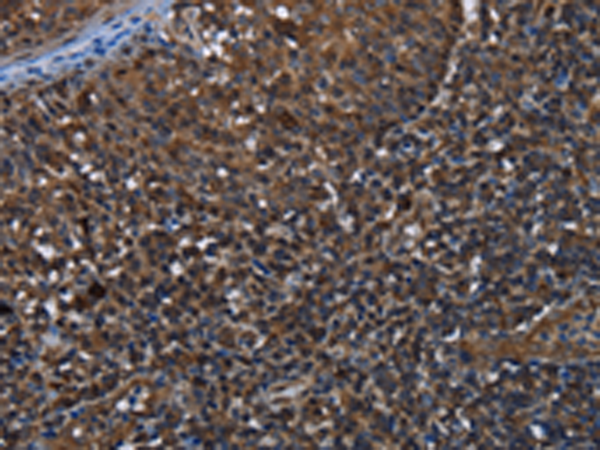


| WB | 咨询技术 | Human,Mouse,Rat |
| IF | 咨询技术 | Human,Mouse,Rat |
| IHC | 1/50-1/200 | Human,Mouse,Rat |
| ICC | 技术咨询 | Human,Mouse,Rat |
| FCM | 咨询技术 | Human,Mouse,Rat |
| Elisa | 1/2000-1/5000 | Human,Mouse,Rat |
| WB Predicted band size | 43 kDa |
| Host/Isotype | Rabbit IgG |
| Antibody Type | Primary antibody |
| Storage | Store at 4°C short term. Aliquot and store at -20°C long term. Avoid freeze/thaw cycles. |
| Species Reactivity | Human, Mouse, Rat |
| Immunogen | Fusion protein of human GALT |
| Formulation | Purified antibody in PBS with 0.05% sodium azide and 50% glycerol. |
+ +
以下是关于GALT(抗组织转谷氨酰胺酶,常见于乳糜泻研究)抗体的3篇代表性文献,按研究重点分类列举:
---
1. **文献名称**:*Tissue Transglutaminase-Specific Antibodies in Celiac Disease*
**作者**:Dieterich, W., et al.
**摘要**:该研究首次揭示乳糜泻患者血清中特异性抗组织转谷氨酰胺酶(tTG)抗体的存在,并证实其与肠道损伤的病理机制相关,为乳糜泻的无创诊断提供了重要标志物。
2. **文献名称**:*Comparison of Antibody Assays for Celiac Disease*
**作者**:Kurppa, K., et al.
**摘要**:通过对比多种抗体检测方法(包括GALT/tTG抗体),发现IgA类tTG抗体检测在乳糜泻筛查中具有高敏感性和特异性,优于传统抗肌内膜抗体(EMA)检测。
3. **文献名称**:*The Role of Transglutaminase 2 in Celiac Disease Pathogenesis*
**作者**:Sollid, L.M., et al.
**摘要**:深入探讨tTG酶在乳糜泻发病中的作用,解释其如何催化麦胶蛋白脱酰胺化并触发自身抗体(如GALT抗体)产生,从而引发免疫反应和肠道炎症。
---
**备注**:GALT抗体常与“乳糜泻”研究关联,上述文献聚焦其诊断价值、检测方法及致病机制。如需特定主题(如非乳糜泻相关研究),可提供补充信息进一步筛选。
**Background of GALT Antibodies**
Galactose-1-phosphate uridyltransferase (GALT) is a critical enzyme in the Leloir pathway, responsible for converting galactose to glucose-1-phosphate. Deficiency in GALT activity causes classic galactosemia, a rare autosomal recessive disorder that leads to toxic accumulation of galactose metabolites, resulting in severe neonatal complications (e.g., liver dysfunction, cognitive impairment) if untreated.
GALT antibodies are immunodetection tools developed to identify and quantify the GALT protein in research and diagnostics. These antibodies, often polyclonal or monoclonal, are generated by immunizing animals with purified or recombinant GALT antigens. They enable techniques like Western blotting, ELISA, and immunohistochemistry to assess GALT expression levels, localization, or structural abnormalities in clinical samples (e.g., blood, fibroblasts) or experimental models.
In diagnostics, GALT antibodies aid in confirming galactosemia diagnoses, particularly in cases where enzymatic activity assays are inconclusive. They also support newborn screening programs and carrier testing. Research applications include studying GALT mutations, enzyme kinetics, and molecular mechanisms underlying galactosemia variants (e.g., Duarte variant). Reliable GALT antibodies are essential for advancing therapeutic strategies, such as enzyme replacement or gene therapy, to address this lifelong metabolic disorder.
×